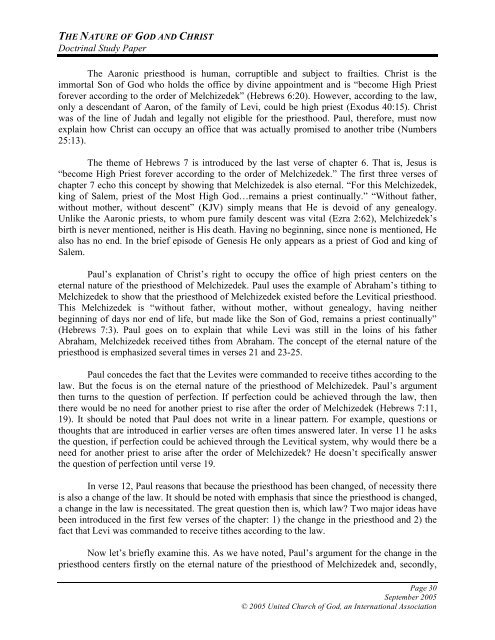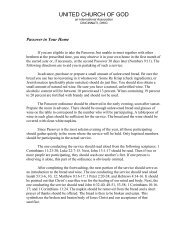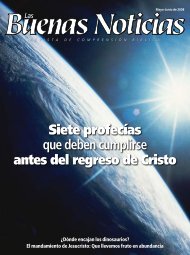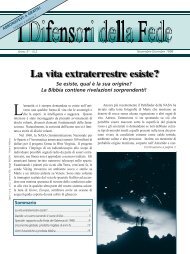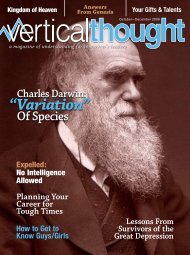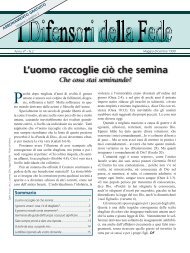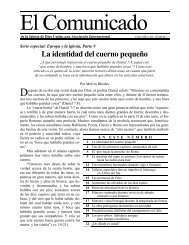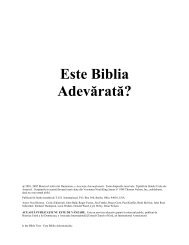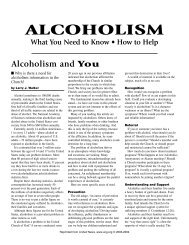The Nature of God and Christ - Members Site - United Church of God
The Nature of God and Christ - Members Site - United Church of God
The Nature of God and Christ - Members Site - United Church of God
- No tags were found...
You also want an ePaper? Increase the reach of your titles
YUMPU automatically turns print PDFs into web optimized ePapers that Google loves.
THE NATURE OF GOD AND CHRISTDoctrinal Study Paper<strong>The</strong> Aaronic priesthood is human, corruptible <strong>and</strong> subject to frailties. <strong>Christ</strong> is theimmortal Son <strong>of</strong> <strong>God</strong> who holds the <strong>of</strong>fice by divine appointment <strong>and</strong> is “become High Priestforever according to the order <strong>of</strong> Melchizedek” (Hebrews 6:20). However, according to the law,only a descendant <strong>of</strong> Aaron, <strong>of</strong> the family <strong>of</strong> Levi, could be high priest (Exodus 40:15). <strong>Christ</strong>was <strong>of</strong> the line <strong>of</strong> Judah <strong>and</strong> legally not eligible for the priesthood. Paul, therefore, must nowexplain how <strong>Christ</strong> can occupy an <strong>of</strong>fice that was actually promised to another tribe (Numbers25:13).<strong>The</strong> theme <strong>of</strong> Hebrews 7 is introduced by the last verse <strong>of</strong> chapter 6. That is, Jesus is“become High Priest forever according to the order <strong>of</strong> Melchizedek.” <strong>The</strong> first three verses <strong>of</strong>chapter 7 echo this concept by showing that Melchizedek is also eternal. “For this Melchizedek,king <strong>of</strong> Salem, priest <strong>of</strong> the Most High <strong>God</strong>…remains a priest continually.” “Without father,without mother, without descent” (KJV) simply means that He is devoid <strong>of</strong> any genealogy.Unlike the Aaronic priests, to whom pure family descent was vital (Ezra 2:62), Melchizedek’sbirth is never mentioned, neither is His death. Having no beginning, since none is mentioned, Healso has no end. In the brief episode <strong>of</strong> Genesis He only appears as a priest <strong>of</strong> <strong>God</strong> <strong>and</strong> king <strong>of</strong>Salem.Paul’s explanation <strong>of</strong> <strong>Christ</strong>’s right to occupy the <strong>of</strong>fice <strong>of</strong> high priest centers on theeternal nature <strong>of</strong> the priesthood <strong>of</strong> Melchizedek. Paul uses the example <strong>of</strong> Abraham’s tithing toMelchizedek to show that the priesthood <strong>of</strong> Melchizedek existed before the Levitical priesthood.This Melchizedek is “without father, without mother, without genealogy, having neitherbeginning <strong>of</strong> days nor end <strong>of</strong> life, but made like the Son <strong>of</strong> <strong>God</strong>, remains a priest continually”(Hebrews 7:3). Paul goes on to explain that while Levi was still in the loins <strong>of</strong> his fatherAbraham, Melchizedek received tithes from Abraham. <strong>The</strong> concept <strong>of</strong> the eternal nature <strong>of</strong> thepriesthood is emphasized several times in verses 21 <strong>and</strong> 23-25.Paul concedes the fact that the Levites were comm<strong>and</strong>ed to receive tithes according to thelaw. But the focus is on the eternal nature <strong>of</strong> the priesthood <strong>of</strong> Melchizedek. Paul’s argumentthen turns to the question <strong>of</strong> perfection. If perfection could be achieved through the law, thenthere would be no need for another priest to rise after the order <strong>of</strong> Melchizedek (Hebrews 7:11,19). It should be noted that Paul does not write in a linear pattern. For example, questions orthoughts that are introduced in earlier verses are <strong>of</strong>ten times answered later. In verse 11 he asksthe question, if perfection could be achieved through the Levitical system, why would there be aneed for another priest to arise after the order <strong>of</strong> Melchizedek? He doesn’t specifically answerthe question <strong>of</strong> perfection until verse 19.In verse 12, Paul reasons that because the priesthood has been changed, <strong>of</strong> necessity thereis also a change <strong>of</strong> the law. It should be noted with emphasis that since the priesthood is changed,a change in the law is necessitated. <strong>The</strong> great question then is, which law? Two major ideas havebeen introduced in the first few verses <strong>of</strong> the chapter: 1) the change in the priesthood <strong>and</strong> 2) thefact that Levi was comm<strong>and</strong>ed to receive tithes according to the law.Now let’s briefly examine this. As we have noted, Paul’s argument for the change in thepriesthood centers firstly on the eternal nature <strong>of</strong> the priesthood <strong>of</strong> Melchizedek <strong>and</strong>, secondly,Page 30September 2005© 2005 <strong>United</strong> <strong>Church</strong> <strong>of</strong> <strong>God</strong>, an International Association


